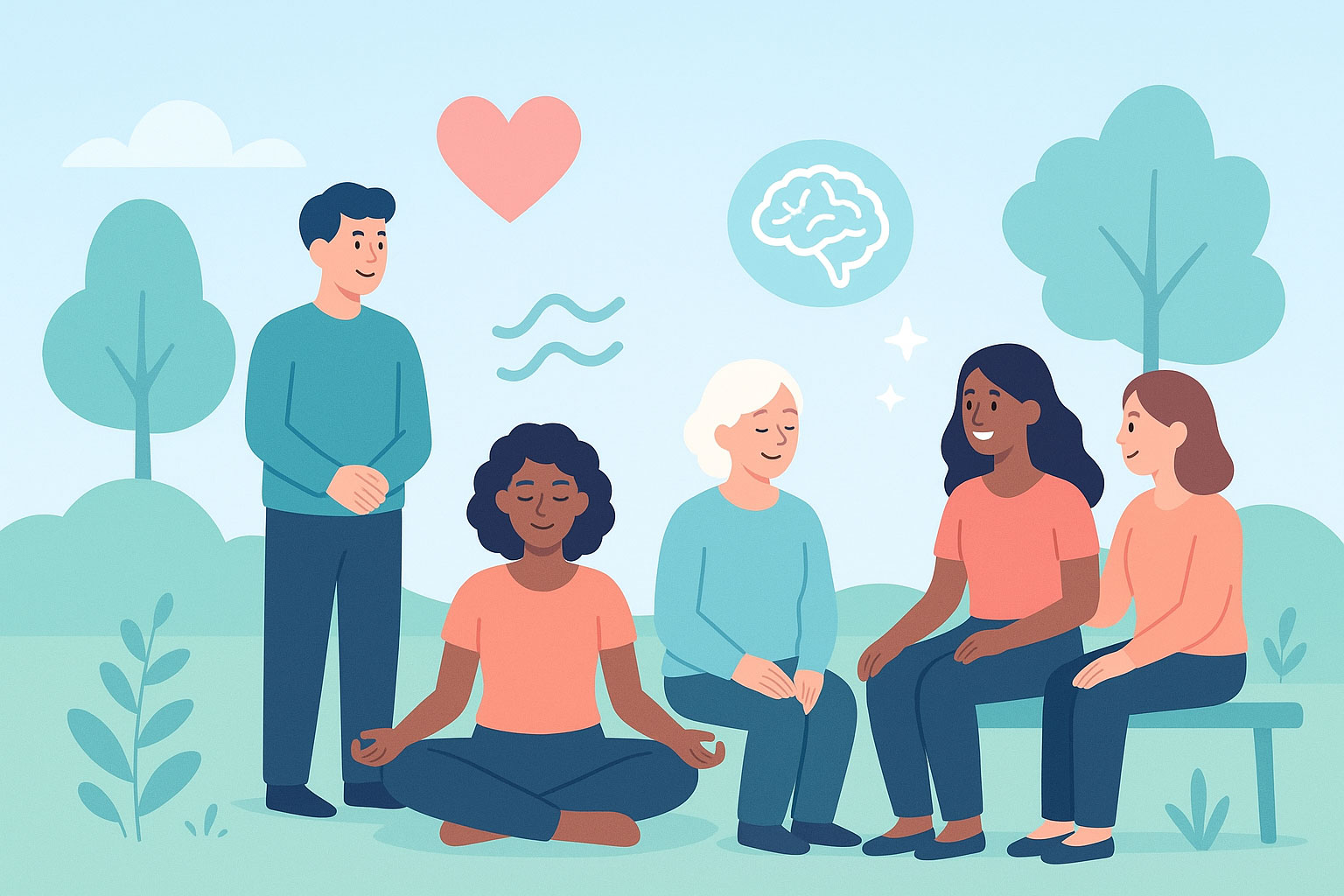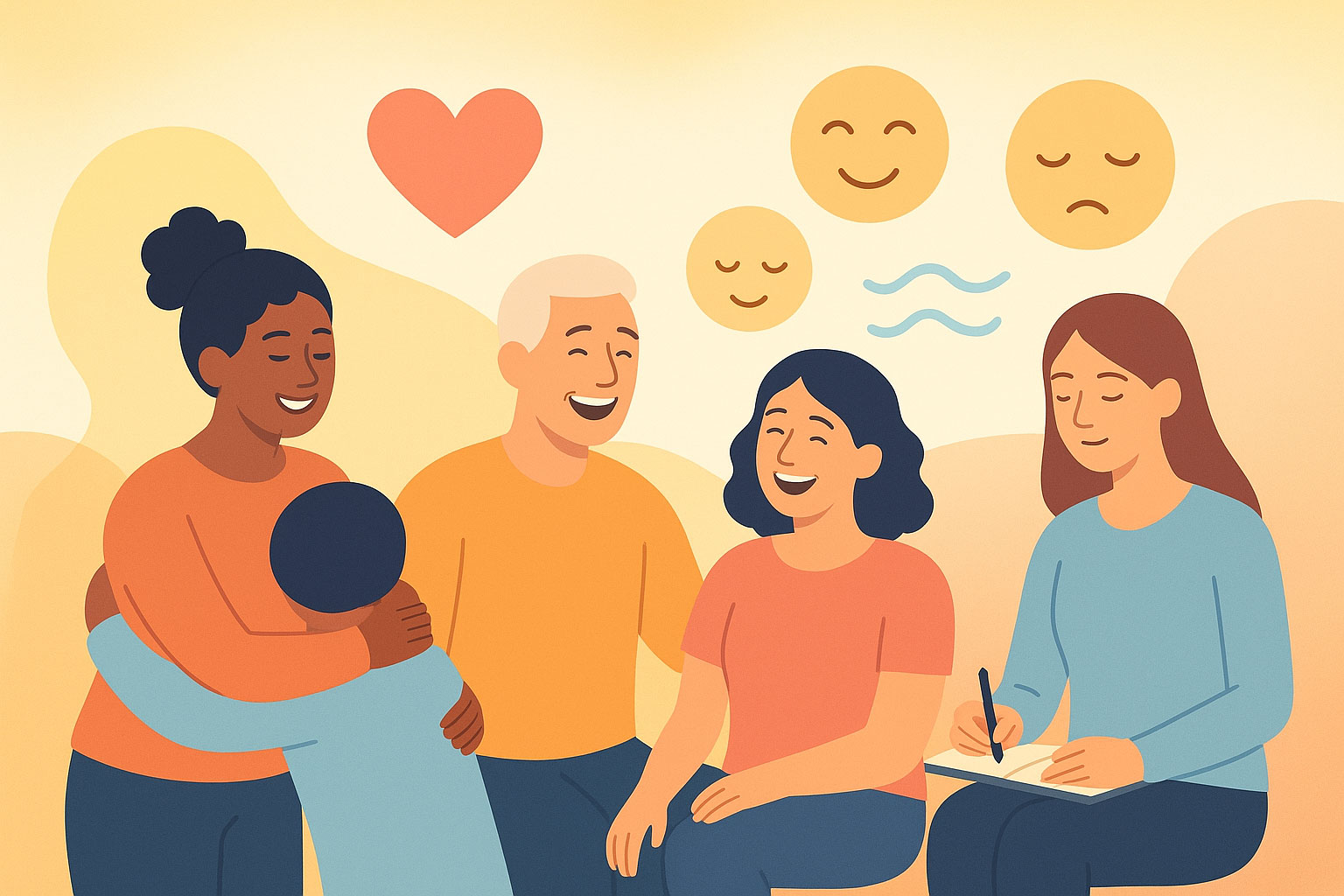People often use the terms “mental health” and “emotional health” interchangeably in today’s fast-paced world. They are not the same thing, but they are very closely related and affect each other in big ways. If you want to live a healthier, more balanced life, you need to know the difference between mental health and emotional health.
Both are very important in how we think, feel, and act. Mental health is about how we think and make choices, while emotional health is about how we deal with and show our feelings.
So, why is this difference important? We can deal with problems like anxiety, emotional outbursts, or feeling overwhelmed better when we know the difference. In this blog post, we’ll go into detail about each idea, point out the main differences, talk about how they work together, and give you useful tips on how to make both stronger.
This guide will help you understand the differences between mental and emotional health and why they are important, whether you are a student, a professional, or just someone who wants to know more about yourself.

What Is Mental Health?
Mental health is the state of your mind, including how well you think, how well you process information, and how well you feel. It affects how you think, learn, make choices, deal with stress, get along with others, and live your life.
You can do the following when your mind is healthy:
- Think in a clear and logical way
- Stay focused and get things done.
- Make smart choices
- Handle the stresses of life
- Keep your behavior and relationships stable.
When mental health is not good, it can cause problems like
- Anxiety disorders
- Feeling sad
- Bipolar disorder
- Obsessive-compulsive disorder (OCD)
- Post-traumatic stress disorder (PTSD)
- Schizophrenia or other serious mental disorders
Key Components of Mental Health
| Aspect | Description |
|---|---|
| Cognitive Function | How well your brain processes thoughts, learns, remembers, and solves problems. |
| Emotional Regulation | Your brain’s ability to regulate feelings, although this overlaps with emotional health. |
| Behavioral Stability | Your ability to control actions and impulses in a socially acceptable way. |
| Resilience | The ability to bounce back from setbacks and adapt to adversity. |
Signs of Good Mental Health
- You are sure about the choices you make every day.
- You can keep your mind clear and focused.
- You have a realistic view of life.
- You can talk about your problems and ask for help when you need it.
Mental Health Is Not Just the Absence of Illness
It’s important to remember that mental health isn’t just about not having a diagnosis. Just like physical health is more than just not being sick, mental health is about how well your mind is working overall.

What Is Emotional Health?
Emotional health is the ability to understand, control, and express your feelings in a way that is helpful and balanced. It’s about how well you deal with both the good and bad feelings that come with life.
Mental health has to do with how you think, while emotional health has to do with how you feel and how you deal with, show, and respond to those feelings in yourself and others.
Core Elements of Emotional Health
| Component | Description |
|---|---|
| Self-awareness | Recognizing your own emotions and understanding their source. |
| Emotional regulation | Managing strong emotions like anger, sadness, or anxiety without being overwhelmed. |
| Empathy | Understanding and responding to the emotions of others with compassion. |
| Emotional expression | Communicating feelings in a healthy and honest way, whether through words, actions, or creativity. |
Examples of Good Emotional Health
- Being able to stop and think before reacting emotionally when things get tough
- Being able to say how you feel without feeling bad, ashamed, or angry
- Knowing when your emotions are too much and doing something about it
- Being okay with asking for help or setting limits
Common Signs of Poor Emotional Health
- Mood swings all the time
- Ignoring or pushing down feelings
- Not being able to deal with stress or conflict
- Feeling emotionally “numb” or like you’re always too busy
Emotional Health Is a Daily Practice
Emotional health is something you work on every day by thinking about yourself, talking to others, and using healthy coping skills. Mental health, on the other hand, is more clinical or diagnostic.
Key Differences Between Mental and Emotional Health
Mental health and emotional health are closely linked, but they are not the same thing. Knowing the differences between the two can help you figure out what you need, come up with better ways to deal with problems, and get the right help when you need it.
Here’s a detailed breakdown to show the difference:
| Aspect | Mental Health | Emotional Health |
|---|---|---|
| Focus Area | Thinking, cognition, psychological functioning | Feeling, emotional regulation, self-expression |
| Function | How you process information, solve problems, and focus | How you manage and express emotions |
| Impact of Imbalance | Trouble concentrating, memory issues, anxiety, or depression | Mood swings, poor emotional reactions, withdrawal |
| Observable Signs | Disorganized thoughts, confusion, fatigue | Anger, sadness, irritability, emotional outbursts |
| Treatment & Support | Often involves therapy, medication, lifestyle changes | Focuses on self-awareness, coping tools, therapy |
| Examples of Struggles | Depression, OCD, bipolar disorder | Emotional detachment, poor anger management |
How They Differ in Real Life
Here are some common examples that show the difference:
- Someone might have good mental health (can focus at work and plan well) but bad emotional health (has trouble with jealousy or emotional outbursts).
- Someone else might be emotionally strong (good at dealing with loss or setbacks), but they might also have a mental health problem like anxiety that makes it hard for them to think or sleep.
Different Yet Connected
Mental and emotional health often affect each other, even though they are not the same thing.
- Mental burnout can happen when you are under a lot of emotional stress for a long time.
- Mental disorders that aren’t treated can make it harder to control your emotions.
How Mental and Emotional Health Are Connected
Mental health and emotional health are both important parts of well-being, but they are very closely related and always affect each other. You can think of them as two parts of the same thing. What has an effect on one often has an effect on the other.
The Mind-Emotion Loop
Our thoughts and feelings are closely connected. A negative thought can make us feel something, and feelings that aren’t resolved can make it hard to think clearly.
For example:
- Being anxious (mental health) can make you angry or sad (emotional health).
- Emotional health can suffer if you don’t let yourself feel things like anger or grief. Mental health can suffer if you don’t let yourself feel things like anger or grief.
Real-Life Examples of the Connection
- Someone who is depressed may start to cut themselves off from other people, which can lead to loneliness.
- People who are emotionally strong (like those who can handle stress or setbacks) may be better able to deal with mentally difficult situations.
- Stress from daily life, like always being frustrated, can make you mentally tired, make it hard to focus, or make you anxious.
When One Impacts the Other
| Situation | Mental Health Impact | Emotional Health Impact |
|---|---|---|
| Chronic work stress | Trouble focusing, sleep disruption | Frequent irritability, emotional burnout |
| Loss of a loved one | Depression, anxiety | Deep sadness, emotional withdrawal |
| Practicing mindfulness or journaling | Improved clarity, reduced anxiety | Better emotional regulation |
| Repressed anger or grief | Intrusive thoughts, negative thinking | Emotional numbness, outbursts |
Why It’s Important to Distinguish Between the Two
It’s not just an academic exercise to know the difference between mental health and emotional health. It matters in the real world for your health. When we mix these two areas up, we might miss important needs, use the wrong coping tools, or wait too long for the right kind of help.
Here’s why it matters:
1. More Accurate Self-Awareness
It helps to know if you’re dealing with a thought-based problem (like overthinking or not being able to focus) or a feeling-based problem (like sadness or being too emotional).
- Make it easier to see what you’re having trouble with
- Use the right coping skills to respond
- Keep better track of your personal growth
2. Getting the Right Kind of Support
Different problems need different kinds of help:
- Therapy, medicine, or changes to your lifestyle may be needed for mental health issues.
- Writing in a journal, being mindful, going to support groups, or getting help with communication might help with emotional problems.
You are more likely to:
- Get help from a professional when you need it.
- Don’t get the wrong idea about your own experience.
- Stop stress and confusion that aren’t necessary
3. Better Communication with Others
When you can clearly say if you’re mentally drained or emotionally overwhelmed, it makes it easier for other people to help and respond to you.
For example:
“I feel mentally drained after a long day at work.” “I feel emotionally drained after a hard talk.”
Both are true, but they need different kinds of help.
4. More Targeted Self-Care
Self-care works better when you know what needs your attention:
- To clear your mind, try doing deep work sessions, taking structured breaks, or doing brain exercises.
- Meditation, creative activities, or deep conversations can help you find emotional balance.
5. Reduces Stigma Around Mental Health
People often mix up mood swings with serious mental health problems, or the other way around. It can help to make the difference:
- Talk about both in a normal way
- Educate others
- Make it less scary or shameful to ask for help
In short…
Knowing the difference between mental and emotional health can help you make better, more focused choices for your overall health.
It’s not about keeping them apart; it’s about learning how they work together and giving each one the support it needs.
Final Thoughts
In today’s world, where mental overload and emotional burnout are becoming more common, it’s more important than ever to know the difference between mental health and emotional health and how closely they are connected.
Mental health is about how you think, make decisions, and stay stable mentally. Emotional health is about how you deal with and show your feelings. Both are important parts of your overall health, and you shouldn’t ignore either of them.
You can do the following by understanding their unique roles:
- Find the source of your problems more clearly
- Learn how to deal with stress and problems in a healthier way.
- Pick the right tools and support systems to help you grow.
Don’t forget that a balanced life means taking care of both your mind and your feelings. Every step you take to understand yourself, whether it’s writing in a journal, meditating, or talking to a therapist, is a step toward healing and strength.

